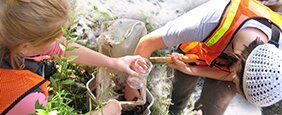Background for Teachers
The goal of this is to help other students improve, streamline and/or clarify their claim, their reasoning, and the evidence they are going to use to back up their claim. Practicing scientists have their work reviewed at every stage of a research project - when they propose the project, as they work through it, and when they write up or present results. Being able to compose a constructive review and to respond to others’ reviews is a critical skill for scientists.
What does constructive criticism look and sound like? (solicit ideas and set some class ground rules). Scientists use the term “review” for constructive criticism.
Some guidelines for giving constructive criticism include making the criticism relevant and appropriate to the context, describing the claim, reasoning or evidence carefully and accurately first, offering both positive and negative criticism whenever possible, being specific, and explaining how to improve.
It may be best to do one (or all) reviews as a class.
Goals
- Understand the underpinnings of a good scientific argument and review the scientific claims of other student scientists for clarity and for validity
- Practice constructive criticism
Outcomes
- Students will review scientific claims videos of other student scientists
- Students will construct and post to Vimeo a constructive response to the claim and/or reasoning (ideally for three other research groups)
Where does this lesson happen in the Project?
This is the fourth activity in Unit 3: Questions and Claims. This hypothesis video review must happen after other groups have developed their scientific claims and posted their claim videos.
Getting Ready
You may want to review
Materials
- Scientific Claims Inter-School Video Review worksheet
- Video Response worksheet
- Computer with Internet access
- A class Vimeo account (see “Joining the Peer-to-Peer Claim Sharing Group” () for instructions on getting your account if you do not already have one)
Handouts (see also Lesson Resources)
- Scientific Claims Inter-School Video Review worksheet
- Video Response worksheet
Student Prerequisites
- Students do not need to have constructed their own hypothesis video to review the videos of others
- They do need to understand how to make constructive criticism before posting their reviews
Time Needed
approximately 80 minutes
Note - Depending on the students and the amount of time available you can:
- Lead the students in a discussion of what they need to include to respond to other people’s videos constructively
- Give the student groups the review form and have them review and write a response
- Have students use the review form and give them a pre-written response script
Doing the Activity
Access the videos on (contact Acadia Learning staff if you do not have access).
Watch a video as a class and begin the discussion about the claim, the justification, the evidence that the group is going to use and the hypothetical graphs.
Use the following points to discuss the claim, justification, and evidence that the group is going to use.
- Can someone re-state this group’s claim (justification, evidence) in their own words?
- Anyone want to add on to that?
- Does everyone agree with (name of your student)’s re-statement? yes (move on) no- don’t agree- could you add on or restate? (if re-state, in what way are these two statements different?) (if need be go through clarifying process again) or “what I think I hear you saying is... “ articulate the differences between the two statements
- How confident do you feel that that is what this group is saying?
- What can you say to this group about their claim (justification, evidence)?
- Additionally, do the hypothetical graphs make sense?
Guide a response discussion.
- What can we say to this group? (solicit input)
- Suggest five sentences:
- An opening sentence (make this nice, specific and complimentary)
- A sentence about their claim: We did not understand your claim, but we think you said __________, is this right? We understood your claim about________ (have them restate the claim in their own words)
- A sentence about the reasoning: We did not understand your reasoning, but we think you said __________, is this right? or, We did not understand your reasoning, but some reasons that might back up your claim are____________ We understood your reasoning that________ (have them restate the reasoning in their own words)
- A sentence about the evidence: We did not understand how the evidence will support your claim, could you explain? or, We did not understand your evidence, but some other evidence like _________ might back up your claim. We understand the evidence that you’re going to use ________ (have them restate the reasoning in their own words)
- A sentence about the hypothetical graph.
Break the students up into their research groups and have them each review a video from another school’s research group. Use the Scientific Claims Inter-School Video Review worksheet and Video Response worksheet if necessary.
Writing a response: Have students use their Video Response worksheet to write a response to post. If there is time, review the comments before posting. Post comments to Vimeo.
Assessment
Formative
Ask your students: Are there any things about your own claims, reasoning or evidence that you want to modify or streamline after reviewing the claims of other scientists?
Summary
Collect written reviews; ensure that they are fair and relevant. Alternately, post the reviews yourself to ensure fairness and relevancy.
Lesson Extensions and Supplements
Have your students review the scientists’ reviews of the other group’s video.
Lesson Resources
- Scientific Claims Inter-School Video Review worksheet
- Video Response worksheet
- from University of California Museum of Paleontology: A good resource for thinking about science as a social endeavor

 Acadia Learning brings scientists, teachers, and students together in partnerships that result in useful research and effective science education.
Acadia Learning brings scientists, teachers, and students together in partnerships that result in useful research and effective science education.